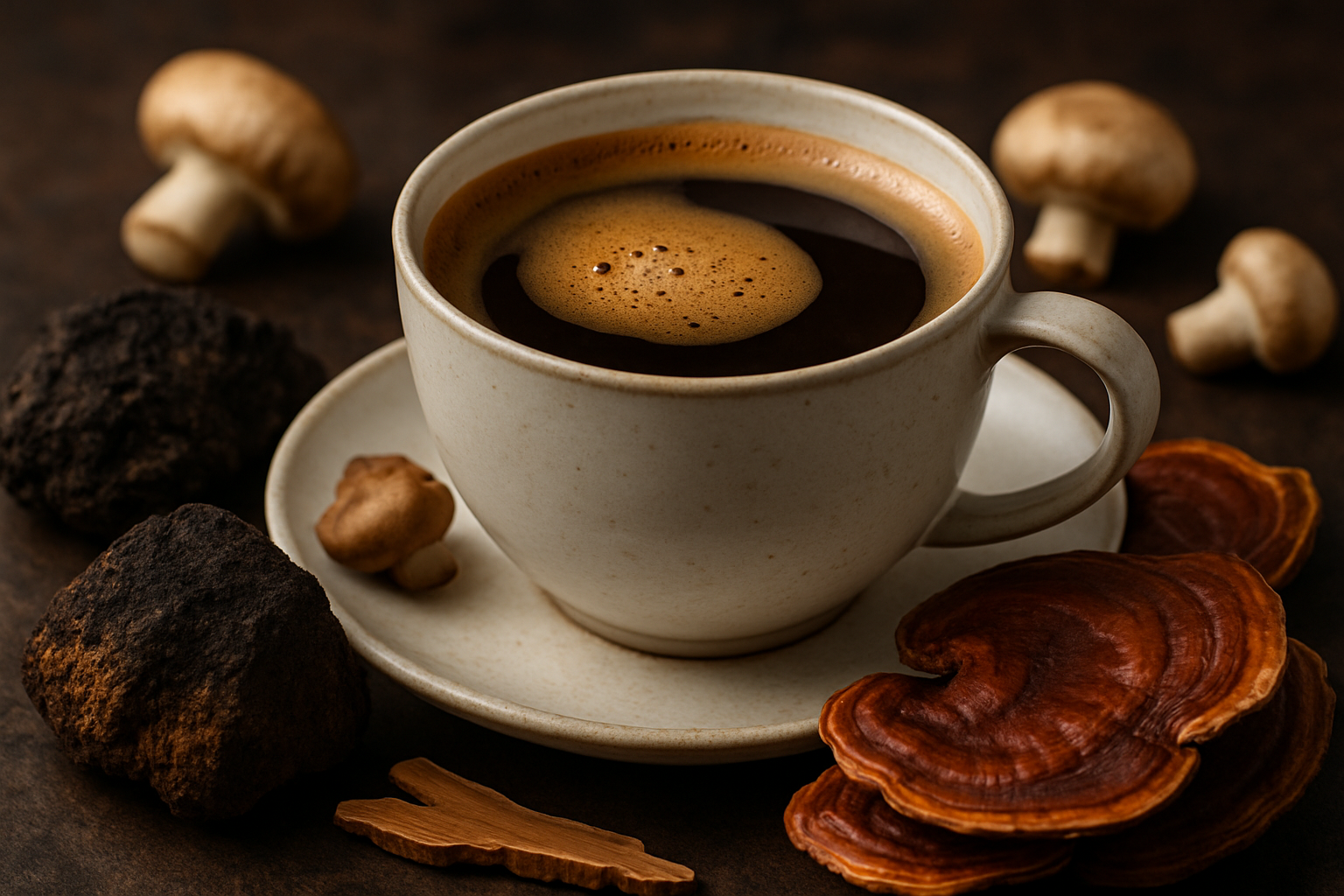Mushroom Coffee: Ancient Knowledge Meets Modern Wellness
Coffee alternatives are gaining popularity as people seek healthier options without sacrificing their morning ritual. Among these alternatives, mushroom coffee stands out as a fascinating fusion of traditional wisdom and contemporary nutritional science. This unique beverage combines the familiar comfort of coffee with the adaptogenic properties of medicinal mushrooms, creating a drink that promises sustained energy without the jitters. What makes this earthy elixir so appealing to health enthusiasts? And could this fungi-infused brew actually deliver benefits that traditional coffee cannot?

The Ancient Roots of Medicinal Mushrooms
Medicinal mushrooms have been valued across cultures for thousands of years, with their use dating back to ancient civilizations in China, Egypt, Greece, and Mesoamerica. In traditional Chinese medicine, fungi like reishi were known as “mushrooms of immortality” and prescribed to emperors to promote longevity and vitality. Indigenous Siberian shamans used chaga mushrooms for their immune-supporting properties, while cordyceps were treasured in Tibetan medicine for enhancing stamina and life force.
These healing traditions remained largely within their cultural contexts until the mid-20th century, when Western scientists began investigating the compounds in these fungi. Research revealed that many traditional mushrooms contained unique polysaccharides, triterpenes, and antioxidants that supported immune function and addressed various health concerns. This scientific validation created a bridge between ancient wisdom and modern wellness practices, setting the stage for innovations like mushroom coffee.
What Exactly Is Mushroom Coffee?
Mushroom coffee isn’t about floating portobello pieces in your morning brew. Rather, it’s a carefully formulated product that combines regular coffee beans with extracts from medicinal mushrooms. The mushrooms used are typically dried, extracted, and then transformed into a powder that’s either mixed with ground coffee beans or sold as an instant coffee product.
The most common mushroom varieties found in these blends include lion’s mane (known for cognitive benefits), chaga (high in antioxidants), reishi (supports stress response), cordyceps (enhances energy), and turkey tail (immune support). Quality products use fruiting body extracts rather than mycelium (the root structure), as the fruiting body contains higher concentrations of beneficial compounds.
The resulting beverage has a milder coffee taste with subtle earthy notes. The reduced coffee content (typically 50-70% of a regular cup) means less caffeine, while the mushroom extracts provide additional benefits without contributing significant flavor alterations. This makes mushroom coffee an approachable entry point for those curious about functional mushrooms.
The Science-Backed Benefits
Research into medicinal mushrooms has accelerated in recent decades, validating many traditional uses and revealing new potential applications. When combined with coffee, these fungi create a drink with unique advantages over regular coffee.
Studies show that beta-glucans and triterpenes in many medicinal mushrooms help modulate immune response, potentially helping the body maintain balanced immunity. Lion’s mane mushroom contains compounds called hericenones and erinacines that may stimulate nerve growth factor production, supporting brain health and cognitive function. Research published in the International Journal of Medicinal Mushrooms found that lion’s mane extract improved mild cognitive impairment in adults aged 50-80.
The adaptogenic properties of mushrooms like reishi help the body manage stress more effectively. A 2018 study in the Journal of Ethnopharmacology found that compounds in reishi mushrooms helped reduce fatigue and improve well-being in participants experiencing stress. Cordyceps, another common addition to mushroom coffee, has been shown to enhance oxygen utilization, potentially improving athletic performance and energy levels.
Perhaps most significantly for coffee drinkers, the reduced caffeine content combined with stress-modulating mushrooms creates a more balanced energy experience. The typical jitters, anxiety, or afternoon crash associated with regular coffee consumption may be mitigated by the adaptogenic effects of the mushrooms.
Comparing Mushroom Coffee to Traditional Coffee
Traditional coffee delivers a rapid energy spike followed by a potential crash, particularly for those sensitive to caffeine. In contrast, mushroom coffee provides a more gradual, sustained energy curve. The reduced caffeine content (typically 40-50mg versus 95-200mg in regular coffee) means less stimulation of stress hormones like cortisol and adrenaline.
From a nutritional perspective, mushroom coffee offers significant advantages. While regular coffee contains some antioxidants, medicinal mushrooms contribute additional antioxidants, beta-glucans, triterpenes, and various vitamins and minerals. For example, chaga mushrooms have one of the highest ORAC scores (a measure of antioxidant capacity) of any natural food.
The pH balance also differs between the two beverages. Regular coffee is quite acidic, which can trigger digestive discomfort for some individuals. Mushroom coffee tends to be less acidic, making it gentler on the stomach and potentially suitable for those who experience acid reflux from regular coffee.
The taste profile represents another notable difference. Traditional coffee offers rich complexity with notes ranging from fruity to chocolatey depending on origin and roast. Mushroom coffee provides a milder flavor with subtle earthiness. For coffee purists, this might be a drawback, but for those seeking a gentler taste experience, it’s often considered an advantage.
How to Incorporate Mushroom Coffee Into Your Routine
Starting with mushroom coffee involves finding quality products and understanding how to integrate them into your existing routine. Look for brands that specify which mushroom extracts they use, the extraction methods, and whether they use fruiting bodies rather than mycelium. Transparency about testing for heavy metals and contaminants is also important, as mushrooms can absorb environmental toxins.
Begin by substituting one regular coffee with mushroom coffee to observe how your body responds. Some people notice immediate differences in energy, focus, and digestive comfort, while others experience more subtle shifts over time. Morning is ideal for varieties containing lion’s mane or cordyceps for energy and focus, while evening is better for reishi-based blends that support relaxation.
Beyond basic preparation, mushroom coffee can be customized with functional additions like collagen peptides, MCT oil, cinnamon, or adaptogens like ashwagandha. Creating rituals around consumption enhances benefits—pairing morning mushroom coffee with meditation or journaling, for example, amplifies its stress-management effects.
For those concerned about taste, starting with blends that contain higher coffee proportions can ease the transition. Alternatively, adding small amounts of natural sweeteners or plant-based milks can mask any unfamiliar flavors while your palate adjusts.
Expert Tips for Maximum Mushroom Coffee Benefits
-
Start with single-mushroom varieties to identify which specific fungi work best for your body before trying complex blends
-
Choose dual-extracted mushroom products (using both water and alcohol extraction) to access the full spectrum of both water-soluble and fat-soluble compounds
-
Cycle between different mushroom varieties throughout the week to receive diverse benefits without developing tolerance
-
Pair lion’s mane mushroom coffee with B vitamins for enhanced cognitive support, as B vitamins work synergistically with compounds in lion’s mane
-
Store mushroom coffee products in airtight containers away from heat, moisture, and direct sunlight to preserve their bioactive compounds
-
Consider taking a two-day break from all caffeine each week to prevent tolerance and maintain sensitivity to the energy-enhancing effects
-
Look for mushroom coffee that specifies beta-glucan content, as this indicates the presence of beneficial compounds rather than just mushroom powder
As our understanding of functional foods continues to evolve, mushroom coffee represents an intriguing intersection of traditional wisdom and modern wellness. This innovative beverage offers a promising alternative for those seeking the ritualistic comfort of coffee with added health benefits and fewer downsides. Whether you’re looking to reduce caffeine jitters, support cognitive function, or simply explore new dimensions of wellness, mushroom coffee provides a fascinating option worth exploring. The growing body of research supporting medicinal mushrooms suggests that this trend has staying power beyond mere novelty, potentially representing a meaningful evolution in how we approach our daily energy rituals.






